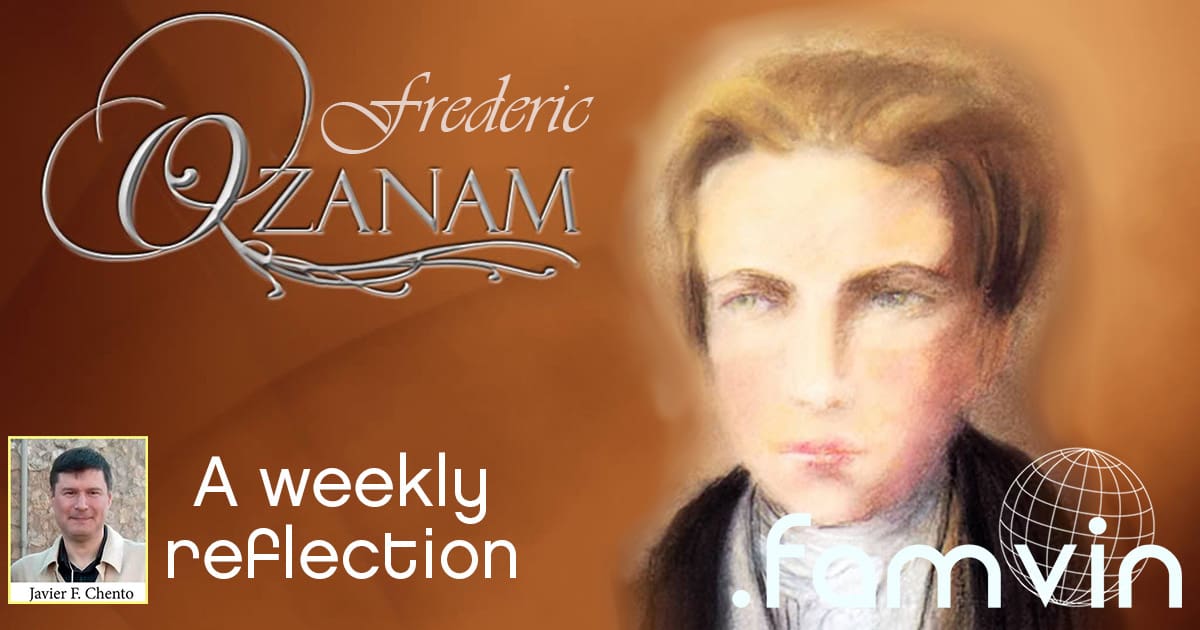Weaving God’s Plan • A Weekly Reflection with Ozanam
We, all of us, are like the weavers of the Gobelins, who, following out the pattern of an unknown artist, endeavor to match the threads of diverse colors on the wrong side of the loom, and do not see the result of their labor. It is only when the work is complete that they can admire at their ease these lovely flowers and figures, those splendid pictures worthy of the palaces of kings. So it is with us, my friends; we work, we suffer, and we see neither the end nor the fruit. But God sees it, and when He releases us from our task, He will disclose to our wondering gaze what He, the great artist, everywhere present and invisible, has woven out of those toils that now seem to us so sterile. He will then deign to hang up in his palace of gold the flimsy web that we have spun.

Frederic Ozanam, cited in Kathleen O’Meara, Frederic Ozanam, professor at the Sorbonne: his life and works, Edimbourg: Edmonston & Douglas, 1876, chapter XVIII.
Reflection:
- Let us first explain the reference to the Gobelins: in the 15th century, Jehan Gobelin opened his dyeing workshop in the Saint Marceau district of Paris. Decades later, his descendants acquired vast plots on the banks of the Bièvre, and built large workshops. At the beginning of the 17th century, King Henry IV established a development program, part of which focused on minimizing the importation of manufactured goods, including tapestries and carpets used in royal and government facilities, for which he established upholstery workshops in the buildings rented to the Gobelin descendants, properties that were later bought by Louis XIV in 1662. In them were installed not only painters and upholsterers, but also goldsmiths, forgers, engravers, and cabinetmakers. His works acquired an international reputation for their magnificence.
- In the mid-1840s, Frederic is at the height of his professional development. He wrote a mcuh (literary works and lettera) and worked as a professor at La Sorbonne, while the Society of St. Vincent de Paul continued to grow at an astonishing rate.
- We know that on March 15, 1848, a meeting of teachers took place in his house to study “a plan (with the help of the Carmelites) to offer classes for workers” (Letter to Alphonse Ozanam, March 15, 1848 ). The biographer O’Meara, gives more details of these classes that were given in the crypt of St. Sulpice to a group of workers (the author provides us with details that are not found in earlier documents and that were possibly obtained from conversations that O’Meara had with Amélie Soulacroix, Frederic’s widow, when O’Meara began writing her biography of Frederic, about 1875.
- Thus, she tells us that Frederic once said to the workers: “My friends, we have each of us our trade in this life. My trade is to wade through old books; well, I can assure you that under the dust of these old folios I come upon lessons which the past has bequeathed to us under the most fascinating form.” Work, an obligation of all, is one of the regenerating forces of the world. Work is an obligation that is placed on everyone amd no one should be idle. In one of his works (La Civilisation au Cinquième Siecle), he says that “Christianity restored [labor] to its original rank by the example of Christ and the apostles, by that of St. Paul, who went into partnership with the Jewish man, Aquila at Corinth rather than eat bread which he had not gained with the sweat of his brow.”
- Thus, for Frederic, the universal law of labor applies with equal force to workers who plow the land and draw water from the river, and to those who cultivate in the fields of science, art, or literature.
- The above text tells us that, with our work, we carry out God’s plan in a way that we sometimes do not understand; we do not get to see the whole image, and sometimes the sufferings are many, without seeing “neither the end nor the fruit.” But that should not discourage us. There is an old saying that “some plant the seed, others reap the fruit of the harvest.” Let us fulfill our work and be faithful to the obligation (and the gift) of work, because with it we collaborate with God to bring to completion his plan on earth.
Questions for dialogue:
- Do I fulfill my duties at work? Do I consider it as a way to collaborate with God?
- Do I spend too many moments in my life on idle issues, which do not add much to my personal growth?
- Do I worry about my continuing education, day by day?
- If, today, a worker devotes an average of 8 hours a day to labor, do I dedicate at least the same amount of time to work?
Javier F. Chento
![]() @javierchento
@javierchento
![]() JavierChento
JavierChento








Thanks, Javier. “Weaving God’s Plan” touches my heart. And it seems to me that the prayer “Prophets of a Future Not Our Own” (https://www.usccb.org/prayer-and-worship/prayers-and-devotions/prayers/prophets-of-a-future-not-our-own) expresses some ideas that are similar to those of Blessed A. Frédéric Ozanam.